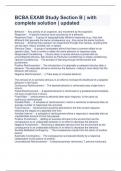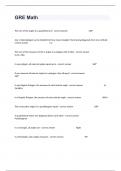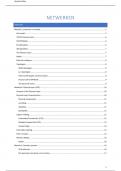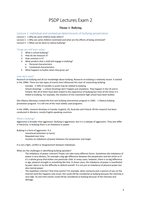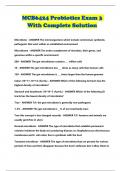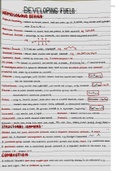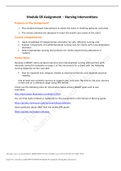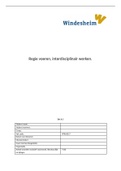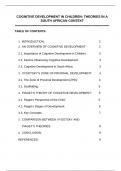CP373: Ethics and Professional Practice Qutaiba Albluwi – Winter 2022
A10: Professional Computing Ethics
If you attended the two sessions for this module, type the following sentence in the white box:
“I certify that I attended the two sessions of Module 10”
If you attended only one sessions type the following sentence:
“I certify that I attended one session of Module 10, which was on <day>”
If you were absent in both sessions, then you cannot submit this report.
I certify that I attended the two sessions of Module 10
Notes:
- Completing section 1 is only required if you attended the first session
- Completing section 2 is required, even if you have missed the second section.
Section 1: Computing as a profession
[1] What are the characteristics of a specific class of 'work' that would make it a
profession?
Taking responsibility/accountability based on your specialized and theoretical knowledge
as well as implement ethical constrains are all characteristics of a specific class of ‘work’
that would make it a profession.
[2] Other than computing, list four practices that are considered “professions”
which maintain codes for professional ethics.
1 Lawyers
2 Physicians / Doctors
3 Teachers
4 Financial Advisors
[3] Since code of ethics are not enforceable what are the benefits of introducing
them? List four arguments.
1 Encourages discussions of ethics and compliance
2 Empowers employees to handle ethical dilemmas that they may encounter
during their everyday work
3 Serves as a valuable reference, helping employees
1
, CP373: Ethics and Professional Practice Qutaiba Albluwi – Winter 2022
4 Helps regulate work and employees are able to operate more freely while
feeling a lot more comfortable and secure due to the reduced risk of harm
[4] List two arguments for computing to be considered a profession
1 Better Salary
2 Will save the community from the large amount of “garbage” code
[5] List two arguments against considering computing as profession
1 More education before practice
2 Too restrictive on the IT development
Section 2: Professional Computing Ethics
Part 1: The ACM code
1.1: What are the four major sections in the ACM code?
1 GENERAL ETHICAL PRINSIPLES
2 PROFESSIONAL RESPONSIBILITIES
3 PROFESSIONAL LEADERSHIP PRINCIPLES
4 COMPLIANCE WITH THE CODE
Part 2: ACM Section 1: General Ethical Principles
2.1: What are the seven ethical principles outlined in the code?
1. Contribute to society and to human well-being, acknowledging that all
people are stakeholders in computing.
2. Avoid Harm
3. Be honest and trustworthy
4. Be fair and take action not to discriminate
5. Respect the work required to produce new ideas, inventions, creative
works, and computing artifacts.
6. Respect Privacy
7. Honor confidentiality
2
A10: Professional Computing Ethics
If you attended the two sessions for this module, type the following sentence in the white box:
“I certify that I attended the two sessions of Module 10”
If you attended only one sessions type the following sentence:
“I certify that I attended one session of Module 10, which was on <day>”
If you were absent in both sessions, then you cannot submit this report.
I certify that I attended the two sessions of Module 10
Notes:
- Completing section 1 is only required if you attended the first session
- Completing section 2 is required, even if you have missed the second section.
Section 1: Computing as a profession
[1] What are the characteristics of a specific class of 'work' that would make it a
profession?
Taking responsibility/accountability based on your specialized and theoretical knowledge
as well as implement ethical constrains are all characteristics of a specific class of ‘work’
that would make it a profession.
[2] Other than computing, list four practices that are considered “professions”
which maintain codes for professional ethics.
1 Lawyers
2 Physicians / Doctors
3 Teachers
4 Financial Advisors
[3] Since code of ethics are not enforceable what are the benefits of introducing
them? List four arguments.
1 Encourages discussions of ethics and compliance
2 Empowers employees to handle ethical dilemmas that they may encounter
during their everyday work
3 Serves as a valuable reference, helping employees
1
, CP373: Ethics and Professional Practice Qutaiba Albluwi – Winter 2022
4 Helps regulate work and employees are able to operate more freely while
feeling a lot more comfortable and secure due to the reduced risk of harm
[4] List two arguments for computing to be considered a profession
1 Better Salary
2 Will save the community from the large amount of “garbage” code
[5] List two arguments against considering computing as profession
1 More education before practice
2 Too restrictive on the IT development
Section 2: Professional Computing Ethics
Part 1: The ACM code
1.1: What are the four major sections in the ACM code?
1 GENERAL ETHICAL PRINSIPLES
2 PROFESSIONAL RESPONSIBILITIES
3 PROFESSIONAL LEADERSHIP PRINCIPLES
4 COMPLIANCE WITH THE CODE
Part 2: ACM Section 1: General Ethical Principles
2.1: What are the seven ethical principles outlined in the code?
1. Contribute to society and to human well-being, acknowledging that all
people are stakeholders in computing.
2. Avoid Harm
3. Be honest and trustworthy
4. Be fair and take action not to discriminate
5. Respect the work required to produce new ideas, inventions, creative
works, and computing artifacts.
6. Respect Privacy
7. Honor confidentiality
2


